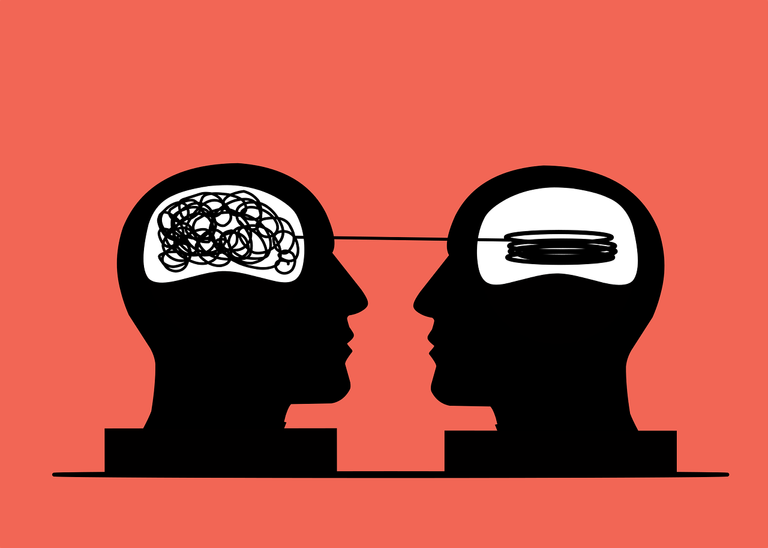
Hola amigas y amigos de Holos & Lotus. Cómo de costumbre navego en la comunidad en busca de propuestas que me hagan reflexionar sobre mi acciones cotidianas y si estas me llevan en la dirección que deseo.
Esta vez me encuentro con las reflexiones de @miriannalis, que nos invita a continuar conociéndonos a través de aquellos con quienes nos relacionamos. Esta es una idea propuesta también por @damarysvibra hace días y que tiene mucha tela por do de cortar. Por suerte, porque el camino del desarrollo humano requiere ser observado desde diferentes artistas.
En este sentido vuelvo a mirar hacia adentro en una especie de ejercicio introspectivo que me devuelva aquellos puntos en los que debo trabajar. En ese proceso puedo notar que aún me faltan cualidades que adquirir puesto que aún cuando uno cree que ha avanzado en este camino, siempre la vida te da la oportunidad de poner a prueba esa hipótesis. Entonces descubres que queda mucho por aprender, hasta el final creo yo que debemos aprender.
Hace días tuve una oportunidad de oro. Fui participe de una situación que me hizo cuestionar cuan empático creía que era. Comencé un debate con un compañero de trabajo y cada uno se aferró a defender su punto de vista, al punto que aquella especie de negociación tomo un rumbo de cero acuerdo y hubo de cerrar el tema sin encontrar una solución aceptable para ambos.
Ya con los ánimos calmados realice un ejercicio que he tratado de incorporar desde hace algún tiempo. Trate de analizar mi comportamiento en esa situacion. Lo hice no por reconocer que estaba equivocado sino porque soy conscientes de que cuando interactuamos con alguien entramos en un intercambio de concepciones del mundo. Concepciones individuales que prendan nuestros análisis.
Además, lo hice porque si hay algo sobre lo que realmente tenemos injerencia es sobre lo que hacemos nosotros mismos, no sobre lo que hacen los demás. Con eso en mente trate de recordar la mayor parte de los pasos que di en esa situación así como las creencias, prejuicios, emociones y hasta inseguridades que me llevaron hasta allí.
Uno de los elementos que podemos utilizar a nuestro favor en un proceso comunicativo es el carácter interactivo del mismo. En una interacción, cada una de las personas que participan influye sobre el otro a través de su propio comportamiento.
¿Acaso has visto que alguien llega alterado a conversar con otra persona y que esa persona no se deja contagiar por el estado de ánimo del exaltado? Puede suceder que el alterado se calme pixo a poco al encontrar un trato afable que no le opone resistencia, que le comprende y empatiza con el.

Volviendo al tema inicial, analizando la situación que les planteaba podría responderme a las preguntas que nos pone sobre la mesa @miriannalis. La primera: ¿Que me quieres mostrar esa persona con esto que estoy sintiendo ahora? Puede que la otra persona sea la que traiga luz a esos rincones oscuros de mi alma sobre loes que no te tenido el valor de indagar.
En el caso específico del que hablo me di cuenta de que aún cuando sigo firme en mi postura, no puedo negar que llegue a la negociación viciado por mis creencias sobre mi compañero de trabajo. Esto tenía de trasfondo una inseguridad relacionada a no tener la razón, y descubrirlo. Quizá también puede que se encuentre asociado a ello la creencia de perdida de algún tipo de poder, al ceder ante la otra persona.
Esto me llevo a que ante el más mínimo obstáculo terminara yo de desplegar el arsenal defensivo que tenía preparado, casualmente para una situación que yo mismo termine co creando. ¡De casual no tiene nada! Simplemente se cumplieron mis expectativas. La psicología explica esto como Efecto Pigmaleon.
Entonces, en un ejercicio autorreflexivo, concientice que en la respuesta de la otra persona estaban implícitas mis propias creencias, sobre ella, sobre mi, sobre ambos.
No hablo de ceder a cada paso porque seguro mi comportamiento está condicionado por mis temores. Que no tengo la razón y como no deseo perder me aferró a mi posición. Entonces debo ceder yo. No hablo de eso.
Hablo de que es preciso, cuando encontremos algo en el otro que nos desagrade, nos preguntemos si en realidad es tan grave lo que hace o si me afecta tanto como creo. Puede ocurrir que dadas nuestras propias características de personalidad maximicemos un defecto en alguien. Eso no nos hace bien, pero además si no miramos de dónde viene puede que sigamos tropezando con la misma piedra, simplemente porque no trabajamos lo que realmente debemos trabajar.
Al final, las emociones y sentimientos que experimentamos las sufrimos nosotros y aunque pueden ejercer influencia en los demás el mayor daño lo experimenta nuestro bienestar psíquico y físico. Este seguirá ahí, pasarán personas y situaciones y seguiremos sintiéndonos del mismo modo incómodo, simplemente pues no hurgar en lo que si podemos cambiar nosotros.
Bueno, agradecido de la compañía hasta el final te dejo un abrazo de amigo. El texto fue traducido al inglés por DeepLTranslate.
English Version

Hello friends of Holos & Lotus. As usual I browse the community in search of proposals that make me reflect on my daily actions and if they lead me in the direction I want.
This time I come across the reflections of @miriannalis, who invites us to continue to know ourselves through those with whom we relate. This is an idea also proposed by @damarysvibra days ago and that has a lot of fabric to be cut. Luckily, because the path of human development requires to be observed from different artists.
In this sense I look inward again in a kind of introspective exercise that gives me back those points I need to work on. In this process I can notice that I still lack qualities to acquire, because even when you think you have advanced on this path, life always gives you the opportunity to test that hypothesis. Then you discover that there is still a lot to learn, until the end I think we must learn.
A few days ago I had a golden opportunity. I was involved in a situation that made me question how empathetic I thought I was. I started a debate with a co-worker and each one of us clung to defend his point of view, to the point that that kind of negotiation took a course of zero agreement and we had to close the subject without finding an acceptable solution for both.
Once I had calmed down, I did an exercise that I have been trying to incorporate for some time. I tried to analyze my behavior in that situation. I did it not to recognize that I was wrong but because I am aware that when we interact with someone we enter into an exchange of conceptions of the world. Individual conceptions that ignite our analysis.
Furthermore, I did it because if there is one thing we really have a say in, it is what we do ourselves, not what others do. With that in mind I tried to remember most of the steps I took in that situation as well as the beliefs, prejudices, emotions and even insecurities that led me there.
One of the elements that we can use to our advantage in a communicative process is its interactive nature. In an interaction, each of the people involved influences the other through their own behavior.
Have you ever seen that someone comes to talk to another person in an upset state of mind and that person does not allow himself to be infected by the state of mind of the person who is in an upset state of mind? It can happen that the upset person calms down little by little when he finds an affable person who does not resist him, who understands him and empathizes with him.

Returning to the initial topic, analyzing the situation I was asking you, I could answer the questions that @miriannalis puts on the table. The first one: What does that person want to show me with what I am feeling now? Maybe the other person is the one who brings light to those dark corners of my soul about which you have not had the courage to inquire.
In the specific case I am talking about, I realized that even though I am still firm in my position, I cannot deny that I came to the negotiation tainted by my beliefs about my co-worker. This had a background of insecurity related to not being right, and finding that out. Perhaps also associated with this may be the belief of losing some kind of power by giving in to the other person.
This led me to the fact that at the slightest obstacle I ended up deploying the defensive arsenal that I had prepared, coincidentally for a situation that I myself ended up co-creating. There is nothing casual about it! My expectations were simply fulfilled. Psychology explains this as the Pigmaleon Effect.
Then, in a self-reflective exercise, I became aware that in the other person's response my own beliefs were implicit, about her, about me, about both of us.
I am not talking about giving in at every step because surely my behavior is conditioned by my fears. That I am not right and because I do not want to lose I cling to my position. Then I must give in. I am not talking about that.
I am talking about the fact that it is necessary, when we find something in the other person that displeases us, to ask ourselves if what they do is really so serious or if it affects me as much as I think it does. It may happen that given our own personality characteristics we maximize a defect in someone. That does us no good, but also if we do not look at where it comes from we may keep stumbling over the same stone, simply because we do not work on what we really need to work on.
In the end, the emotions and feelings that we experience are suffered by us and although they can influence others, the greatest damage is experienced by our psychic and physical well-being. This will continue to be there, people and situations will pass and we will continue to feel the same uncomfortable way, simply because we do not dig into what we can change ourselves.
Well, grateful for the company until the end I leave you a friendly hug. The text was translated into English by DeepLTranslate.